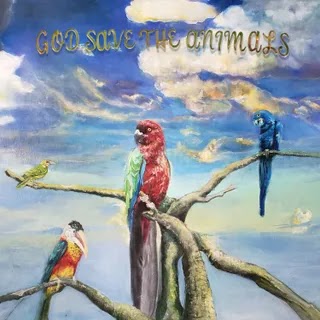Placing its faith in the healing power of animals and Auto-Tune, Alex Giannascoli’s most hopeful record stands out for its grounded patience and moments of sharp lyrical simplicity.
In his later life, the French philosopher Jacques Derrida trained his critical lens away from abstract conceptions of human language and toward his pet cat. How should he feel about returning his cat’s gaze? Should he feel ashamed to let his cat see him nude, vulnerable, on the toilet? If animals cannot express a moral code—if they don’t know that nudity is shameful—are they simply amoral? To Derrida, that’s the wrong question—it’s not whether animals can think, but rather if they can feel. Throughout his enigmatic discography, Alex Giannascoli, who performs as Alex G, has teased out these same thorny issues. On 2012’s Trick, his dog Rosie communicates with just her eyes. Two years later, on DSU, his dog Harvey “doesn’t understand what big boys do,” but Alex loves him anyway. And while the Philadelphia musician is adamant that his songs are not all about dogs, the animals in his life are proxies for his uneasy sense of good and evil. On his latest album, God Save the Animals, he wrings strange beauty from our non-human companions, grappling with innocence and its discontents through their saucer-eyed stares.
In a catalog littered with inscrutable poetics, God Save the Animals stands out for its moments of sharp lyrical simplicity. Rather than sketching out ideas through the barest of sentence fragments, Giannascoli writes with a sense of grounded patience, digging deeper and fleshing out the characters in his stories with extended conversations and commitments. Though his writing has always toed the line between autobiography and autofiction, on God Save the Animals it seems as though the players in his stories—fictional or not—are growing wiser with time. Over the stunning melodies of “Miracles,” he reaches into a whispy falsetto as he considers starting a family. In the past he might have given into despair, but now he warms to the idea: “After all,” he admits, “there’s no way up from apathy.” Across the album, his sense of responsibility is strengthened by the test of time: “You can believe in me,” he sings, warbled, on “Cross the Sea.” “Now you sit with me/I keep you safe,” he reassures on “Ain’t It Easy.” It’s a cautious calmness, interrupted by pitch-shifted vocals and ominous whispers. But even the alien voices lean into comfort rather than their usual eeriness, as on “Cross the Sea”’s repetitions of “I’ll take care of you.”
And then there are the animals. References to pets are more oblique here; names are scarce. But it’s not hard to find man’s best friend peeking out from between the lines. On “Mission,” the bleary-eyed pride of “I did good, I stayed out of the kitchen/I did good, I kept it on track” sounds like the confession of a weary but determined bloodhound. “Runner,” a stunning song about an endlessly reliable companion, tosses off the heartbreaking line, “They hit you with the rolled-up magazine,” a chastisement much more reminiscent of a pet than a human. Does he mean to imply that a person is being scolded like a dog? And if not, what does it mean that we brutalize dogs so casually? The purposely vague subjects on God Save the Animals—whose perspective is portrayed on “Cross the Sea” when he sings, “You see how I make you smile/You put your foot down and I run wild”?—blur the lines between animal and human motivations. There’s a shared ethics built from that ambiguity. Animals, Giannascoli suggests, can definitely feel—fear, loyalty, dignity—even if they cannot quite grasp the need to be saved.
Giannascoli has said that he sees himself more as a producer than a traditional singer-songwriter, and God Save the Animals encapsulates both the folksy quietude of Rocket and the ominous creep of Beach Music. Subtle instrumental embellishments elevate the record: the radiance of a Rhodes piano on “Early Morning Waiting,” the twang of banjo on “Forgive,” and the sharp percussive snap on “Headroom Piano” (named for the renowned Philadelphia studio where the song was recorded). “Runner” builds a simple guitar riff into a warm and gorgeous folk-rock anthem, a rootsy kind of alternative rock in the style of Wilco or the Wallflowers. The song stands out because it stands alone, uniquely straightforward and confident through its verses, gaining momentum without undercutting its earnestness.
There are still lurking surprises: The clear-eyed harmonies and pristine guitar make it all the more gratifying to hear Giannascoli veer off course as he confesses, “I have done a couple bad things,” louder each time, until it’s an unintelligible scream. On “No Bitterness,” he combines his penchant for vocal processing and electronic production with delicate finger-picked guitar and soft drums. Halfway through, the guitars give way to a breakbeat, fueling a hyperpop ballad that works despite its contradictions because of his commitment to being both sweet and maddening at once. If the sounds are blown out, as on “Blessing,” or if room tone leaks in, like on the intro to “No Bitterness,” it feels intentional, not accidental.
It would be facile to call an album with God in its name a religious body of work. An explicit mention of Jesus feels like a half-joke; there are no direct references to churches or holy books. But God Save the Animals does feel like a liturgy of sorts, one that encapsulates Giannascoli’s belief in the healing power of animals and Auto-Tune. It’s also by far his most hopeful record, the dark shadow of early death largely absent from his lyrics. There’s a sense of looking into the future rather than mourning the past: “Forgive yesterday, I choose today,” he sings on the contemplative closer “Forgive.” His voice heaves, as if on the verge of tears, and it sounds like faith.










%20Music%20Album%20Reviews.webp)





0 comments:
Post a Comment